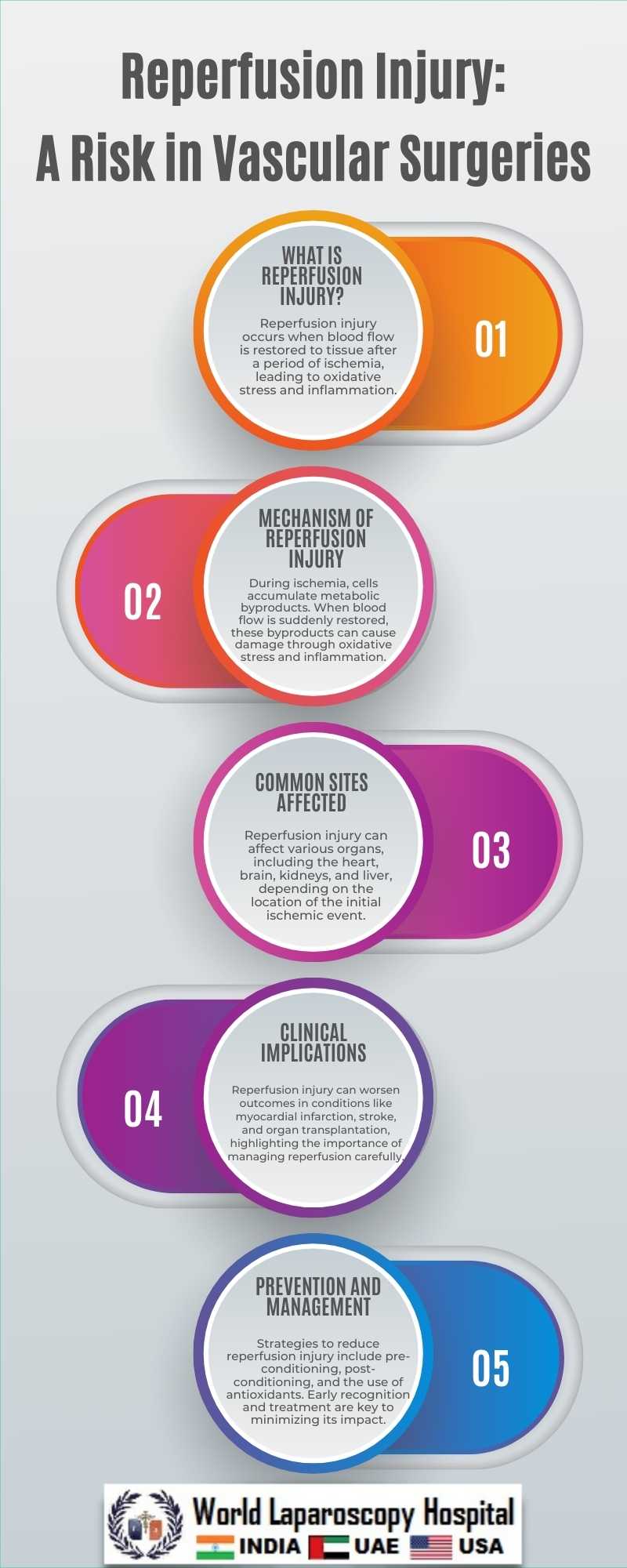Understanding Reperfusion Injury: A Risk in Vascular Surgeries
Reperfusion Injury: A Risk in Vascular Surgeries
Vascular surgeries, which involve procedures on the body's blood vessels, are critical for treating various conditions such as peripheral artery disease, aneurysms, and arterial blockages. While these surgeries are often life-saving, they also carry a risk of a lesser-known complication called reperfusion injury.

Reperfusion injury occurs when blood flow is restored to tissue that has been deprived of oxygen. This can happen during vascular surgeries when a blocked or narrowed vessel is opened to restore blood flow. While the immediate goal is to improve blood flow and prevent tissue damage, the sudden influx of oxygen-rich blood can paradoxically lead to further harm.
The process of reperfusion injury involves several complex mechanisms. When blood flow is restored, it can trigger an inflammatory response in the affected tissues. This inflammatory response can lead to the production of free radicals, which are highly reactive molecules that can damage cells and tissues. Additionally, the sudden increase in oxygen levels can lead to the formation of oxygen-derived free radicals, further exacerbating the damage.
The consequences of reperfusion injury can range from mild tissue damage to severe complications such as organ failure. The risk of reperfusion injury is particularly high in certain types of vascular surgeries, such as those involving prolonged periods of ischemia (lack of blood flow) or reperfusion of large areas of tissue.
To reduce the risk of reperfusion injury, surgeons use various strategies during vascular surgeries. One common approach is to gradually restore blood flow to the affected tissue, rather than rapidly reperfusing it. This allows the tissue to gradually adjust to the increased oxygen levels and reduces the risk of oxidative stress.
Another strategy is the use of antioxidants, which can help neutralize free radicals and reduce the risk of tissue damage. Antioxidants such as vitamin C, vitamin E, and N-acetylcysteine have been shown to be effective in reducing reperfusion injury in experimental studies.
Conclusion:
Reperfusion injury is a significant risk in vascular surgeries that can lead to serious complications. Surgeons must be aware of this risk and take appropriate measures to minimize it, such as using gradual reperfusion techniques and antioxidant therapy. By understanding and addressing the risk of reperfusion injury, surgeons can improve the outcomes of vascular surgeries and enhance patient safety.
Vascular surgeries, which involve procedures on the body's blood vessels, are critical for treating various conditions such as peripheral artery disease, aneurysms, and arterial blockages. While these surgeries are often life-saving, they also carry a risk of a lesser-known complication called reperfusion injury.

Reperfusion injury occurs when blood flow is restored to tissue that has been deprived of oxygen. This can happen during vascular surgeries when a blocked or narrowed vessel is opened to restore blood flow. While the immediate goal is to improve blood flow and prevent tissue damage, the sudden influx of oxygen-rich blood can paradoxically lead to further harm.
The process of reperfusion injury involves several complex mechanisms. When blood flow is restored, it can trigger an inflammatory response in the affected tissues. This inflammatory response can lead to the production of free radicals, which are highly reactive molecules that can damage cells and tissues. Additionally, the sudden increase in oxygen levels can lead to the formation of oxygen-derived free radicals, further exacerbating the damage.
The consequences of reperfusion injury can range from mild tissue damage to severe complications such as organ failure. The risk of reperfusion injury is particularly high in certain types of vascular surgeries, such as those involving prolonged periods of ischemia (lack of blood flow) or reperfusion of large areas of tissue.
To reduce the risk of reperfusion injury, surgeons use various strategies during vascular surgeries. One common approach is to gradually restore blood flow to the affected tissue, rather than rapidly reperfusing it. This allows the tissue to gradually adjust to the increased oxygen levels and reduces the risk of oxidative stress.
Another strategy is the use of antioxidants, which can help neutralize free radicals and reduce the risk of tissue damage. Antioxidants such as vitamin C, vitamin E, and N-acetylcysteine have been shown to be effective in reducing reperfusion injury in experimental studies.
Conclusion:
Reperfusion injury is a significant risk in vascular surgeries that can lead to serious complications. Surgeons must be aware of this risk and take appropriate measures to minimize it, such as using gradual reperfusion techniques and antioxidant therapy. By understanding and addressing the risk of reperfusion injury, surgeons can improve the outcomes of vascular surgeries and enhance patient safety.
2 COMMENTS
Dr. Kumar Chandan
#1
Feb 24th, 2024 6:47 am
Reperfusion injury poses a substantial threat in vascular surgeries, potentially leading to severe complications. Surgeons must acknowledge this risk and employ strategies like gradual reperfusion and antioxidant therapy to mitigate it, thus improving surgical outcomes and ensuring patient safety.
Dr. Kumar Chandan
#2
Feb 26th, 2024 9:56 am
Reperfusion injury poses a substantial threat in vascular surgeries, necessitating surgeon awareness and precautionary measures. Employing gradual reperfusion techniques and antioxidant therapy mitigates risk, enhancing patient safety and optimizing outcomes in vascular procedures.
| Older Post | Home | Newer Post |

